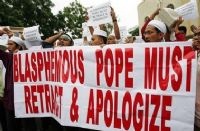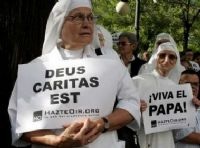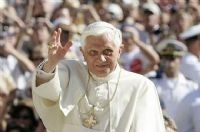Benedict has been nothing if not gracious, devoting devoting a portion of his Wednesday General Audience to clarifying the nature of his speech:
It was a profound reflection, as he did last Sunday before the Angelus prayer, Benedict XVI reiterated the substance of what he had already said: everything took place in an athenaeum, and hence in language that would be employed for a university lecture. In the text of the address, there is a note that the pope intended to add footnotes. Further, the controversial phrase was a quote referring to Muhammad “in a way that is incomprehensible and brusque for us” and which served to “introduce the drama and actuality of the topic.” The pope said that “in no way did I wish to make my own the negative words of the emperor”, that he has “profound respect for world religions and for Muslims, who worship the one God and with whom we promote peace, liberty, social justice.”Benedict XVI also expressed the hope that “after the initial reaction”, his words may “constitute a push towards positive, even self-critical, dialogue between religions and between modern reason and Christian faith.”
In addition, Benedict "invited Muslim envoys to meet with him at his summer residence, for what the Holy See says is urgently needed dialogue" (AP, Sept. 20, 2006). Turkey and Iran accepted his offer, but apparently not everybody is satisfied.
Continuing Muslim Reactions
- Waving Hamas banners at the al-Aqsa Mosque in Jerusalem's Old City, Palestinians have denounced the Pope as a coward and a Jew.
- In Tripoli, a son of Libyan leader Muammar Gaddafi urged the Pope to "embrace" Islam and "learn the truth" (Reuters, Sept. 20, 2006)
- In Hamas-controlled Gaza, Muslims have formed an ad hoc terrorist group promising to attack Christian targets (Arutz Sheva Israel National Times Sept. 19, 2006):
The group, which calls itself the “Army of guidance,” sent an announcement to news agencies based in Gaza saying that “every place relevant to Christians will be a target until the cursed infidel – the Vatican – apologizes to Muslims.”
- In Pakistan, 1,000 Muslim clerics and religious scholars demanded pope's removal (Associated Press. Sept. 21, 2006):
Benedict "should be removed from his position immediately for encouraging war and fanning hostility between various faiths" and "making insulting remarks" against Islam, said a joint statement issued by the clerics and scholars at the end of their one-day convention.
Needless to say, the Vatican is not likely comply with their demand. - The Anti-Defamation League has chronicled continuing Allegations of Jewish Conspiracy Behind Pope's Comments in the Arab/Muslim media, together with some outrageous anti-semitic political cartoons:
ADL also found a growing trend in editorials and opinion-pieces in the Arab/Muslim media that claim the Pope's statements should not surprise anyone, since they are the long-lasting natural discourse of international Zionism against Islam. Some maintain that after September 11 a new Rome was erected, one that aims at converting Christianity and God to Judaism under the watchful eyes of the evil American-Israeli alliance that was established by the international Zionism, which eventually seeks to enflame a full confrontation between Islam and Christianity.
(Hat tip: Bill Cork, who wonders "Where's the Outcry" over this by the US Media?).
However, not all the reactions from the international Muslim community to Benedict's Regensburg speech have been negative:
- Asia News reports that the Sunni Grand Mufti of Syria has said that “The clarifications supplied by the Pope are more than sufficient":
“The clarifications supplied by the Pope are more than sufficient, although I would ask for, if possible, more explanation.” With these words, the Sunni Grand Mufti of the Arab republic of Syria, Ahmad Badr El Din El Hassoun summed up a meeting yesterday – Tuesday – with the Apostolic Nuncio of Syria, Mgr Giovanni Morandini. In a statement to AsiaNews, he added: “The disapproval of Pope Benedict XVI and his bitterness after the recent reactions are more than an ‘apology’ for us and a great sign of respect towards the Islamic world.” El Hassoun called on “all to respect this great personality, Pope Benedict XVI.”
- In an editorial for the Washington Times (Sept. 21, 2006), Farid N. Ghadry, President of the Reform Party of Syria, insists "The words of Pope Benedict should not be examined with scorn but with scrutiny":
As a moderate Muslim living amongst Muslims, Christians, and Jews, I am asking myself what have we, Muslims, brought forth to today's civilizations that would appeal to other religions and prompt them to imitate us or praise us? We have but TV beheadings and barbaric killings of innocent people in the name of our great religion. Are we then surprised to hear other religious people with followers all around the world ask us, through factual history, why we are so violent?
- "Irresponsible Comments; Abhorrent Response" Arab News Sept. 22, 2006. Lubna Hussein is critical of the Pope, but equally (if not more) repulsed by the response of her fellow believers:
It is tragic that we lose our power to reason and allow emotions to dictate our response whenever a situation like this arises. Instead of referring to the teachings of the Qur’an and the Prophet (peace be upon him) a few deviants take it upon themselves to perform atrocities and injustices in the name of Islam.
Since when has the desecration of churches and threats against Christians been acceptable in our religion? . . .
[It is] nothing short of pathetic to watch the mob mentality of some Muslims who, instead of extending this message of peace to the outside world, show a very ugly face when they burn effigies of the pope and attack the lives and property of innocents. Who can blame those who have no understanding of Islam if they cannot see the beauty of the religion through this shameful veneer inspired by hatred and intolerance?
- It is also reported by Asia News that Pakistanese Christians and Muslims met to study the Pope’s speech together:
The meeting, which took place at the Bishop’s residence, is the initiative of the local bishop, Mgr Joseph Coutts, and Fr Aftab James Paul, director of Interfaith Dialogue and Ecumenism for the diocese of Faisalabad. A committee was formed that includes Bishop Coutts himself, two Catholic priests, four ulemas and another Muslim, Pir Muhammad Ibrahim.
The article goes on to note the positive response of some Pakistanese Muslims:In opening the meeting, Mgr Coutts expressed his “joy” to see Muslims and Christians together, but at the same time “sadness” for the overall misunderstanding of what the Pope said in Germany. . . .
Members of the Muslim community said they appreciated the initiative of the local Church.
Perhaps all Catholic bishops experiencing similar unrest in their diocese' should issue a similar invitation to dialogue?For Rana Khalid Mehmood it is necessary to release Mgr Coutts’s remarks to the Pakistani press so that “people can understand the real situation”.
Pir Muhammad Ibrahim is convinced that it is urgent to proceed logically. First, find the real issue; then, if there are problems clarify them through dialogue with our Christian brothers.”
“We have decided to translate the original speech into Urdu so that Muslim clerics can study and better understand it,” he added.
- Back in the U.S., Benedict was subjected to criticism -- suprise, suprise -- in the pages of the National Catholic Reporter, when Bishop Thomas J. Gumbleton admonished the Pope on his choice of words:
But there's another short passage that Jesus proclaimed, that it seems to me if Pope Benedict had been thinking about this, he would have been much more careful in what he said.
(Hat tip: Gerald Augustinus of Closed Cafeteria)Remember the part when Jesus is talking to the people who are correcting other people. He challenged them, "Look, you can see the speck in somebody else's eye, but you can't see the beam in your own eye!"
- In a display of episcopal spine, Benedict received the ecumenical support of the former Archbishop of Canterbury, Lord Carey of Clifton, and His Beatitude the Archbishop of Athens and All Greece Christodoulos, the prelate of the Autocephalous Orthodox Church of Greece.
- Pope's lecture also shakes Catholic theologians, by Bernward Loheide. Deutsche Presse-Agentur Sept. 18, 2006. (Via Argent by the Tiber).
- "Should Vatican aides have warned the Pope?, asks Malcolm Moore of the Telegraph UK (Sept. 19, 2006). Pointing to the recent departures in the papal curia, Moore has the audacity to suggest that an incompetent Benedict might have been kept in line by those well-versed in Islamic etiquette:
Since the exile of Archbishop Michael Fitzgerald to be the papal envoy to Egypt, there are few high-ranking Islamic experts close to the Pope. Yesterday, Archbishop Fitzgerald declined to comment on the row, saying that he was "on retreat" in France.
Fr. Richard J. Neuhaus responds in "The Pope and His Cultured Advisers" (First Things' "On the Square" Sept. 22, 2006):Robert Mickens, the Vatican correspondent of the Tablet, the Catholic newspaper, said the biggest problem was a lack of checks and balances within the Roman Curia under Benedict.
He said that the Pope was surrounded by a cabal of "yes-men" who "hold him in such high regard that they are unlikely to challenge him".
John Paul II was regularly guided either by Cardinal Angelo Sodano, the former secretary of state who resigned this month, or by Joaquin Navarro Valls, the Vatican's press secretary, who served 22 years before retiring earlier this year.
You recall those awful years of John Paul II’s authoritarian and repressive pontificate when the ailing pontiff, taking advice only from a cabal of right-wing intimates and yes men, turned the Catholic Church into a one-man show.
Surely you remember. . . . But now the story line has turned on a dime. After the imbroglio over the Regensburg lecture, we are told that “the authoritarian nature of Pope Benedict’s papacy” [he means pontificate] can be attributed to the fact that he, unlike John Paul, is surrounded by people who are not “brave enough to tell the pope that he has made a mistake.”
Over at Insight Scoop, Carl Olson takes on similar criticisms by Rev. Thomas J. Reese, SJ in the Baltimore Sun (The Usual Suspects with the Usual Suspect Stuff Sept. 20, 2006), and in The Pope's Censor (Open Book ), readers respond to the suggestion by Jesuit Father Tom Michel, who served on the Pontifical Council for Interreligious Dialogue, that this whole mess could have been averted "had the Pope's talk been reviewed and controlled by any competent staff person."
- The Pope, Faith, and Reason - In the hands of the press, it was more like Will and Grace. National Review's Denis Boyles takes aim at the characteristically-incompetent digestion of papal documents by the mainstream media:
Part of the problem journalists face when they have to report on complicated, somewhat obscure topics, such as Roman Catholic dogmatic theology, is that graduate journalism courses like JOM926 may stress spelling & grammar, but completely at the expense of “faith & reason.” So maybe it’s not fair to blame journalists for the inanities in the week’s reporting of what was a very complex discussion by a scholarly pope concerning faith and reason in Christianity and in Islam. . . . Within hours, the BBC World Service had started skipping the complicated bits and simply reported that “the Pope described Islam as evil and inhuman” making the story a much simpler one to report.
Boyles examines the disappointing trend in supermarket tabloid-esque reporting on the story by the New York Times, the London Times, the Guardian, the Telegraph, Le Figaro and the Daily Mail. - For Robert Moynihan, Benedict's speech has been misinterpreted by almost everyone -- by those who condemn him, but also by his defenders ("Reaping the Whirlwind" Inside the Vatican October 2006):
[Benedict's] address is not a "bashing" or "blasting" or "indictment" of Islam but rather a profound reflection on the need for the West to return to religious faith.
Benedict's main point -- and few have noted this -- is that the West, unless it recovers a vision of God, cannot engage in a fruitful dialogue with the other great cultures of the world, which have a basic religious conviction about reality. Among these great cultures, of course, is Islam.
His entire talk is focused on this point.
He attempts to persuade his academic audience that giving theology a voice in the modern Western university would be of immense benefit to Western society, because it would lead to a rational dialogue on the central meaning of human existence; namely, an investigation of the nature of God. Such an inquiry, he says, would counter Europe's destructive denial of its own origins.
- "The Pope was Right!", agrees George Weigel. (L.A. Times Sept. 20, 2006):
CAN ISLAM BE self-critical? Can its leaders condemn and marginalize its extremists, or are Muslims condemned to be held hostage to the passions of those who consider the murder of innocents to be pleasing to God? Can the West recover its commitment to reason and thus help support Islamic reformers? These are the large questions that Pope Benedict XVI has put on the world's agenda. Men and women of reason and goodwill should be very glad that he has done so.
- "Benedict the Brave" Wall Street Journal Sept. 19, 2006:
This is not an invitation to the usual feel-good interfaith round-tables. It is a request for dialogue with one condition--that everyone at the table reject the irrationality of religiously motivated violence. The pope isn't condemning Islam; he is inviting it to join rather than reject the modern world.
See also Pope Provocateur, by Brett Stephens (Wall Street Journal Sept. 20, 2006), insisting that "That speech deserves to be read in its totality, and not simply as the spark that set fire to churches across the West Bank because some Muslim fanatics object to the suggestion that there is too much violence in their religion."By their reaction to the pope's speech, some Muslim leaders showed again that Islam has a problem with modernity that is going to have to be solved by a debate within Islam. The day Muslims condemn Islamic terror with the same vehemence they condemn those who criticize Islam, an attempt at dialogue--and at improving relations between the Western and Islamic worlds--can begin.
- Der Spegiel publishes a lengthy interview with Cardinal Kasper on the Vatican's relations with Muslims and the furor over the pope's recent remarks, conducted by Peter Wensierski and translated from German by Christopher Sultan. Sept. 19, 2006.
- Putting the Pope's Remarks on Islam in Context - [audio] National Public Radio Sept. 19, 206. The fallout continues from Pope Benedict XVI's recent speech addressing Islam, and the Pope's subsequent apology. The Pope's approach to Islam is rooted both in the history of the church, and in the world's modern realities. Lynn Neary talks to author James Reston and reporter John Allen about the Pope's remarks.
- "A Challenge, Not a Crusade", by John Allen Jr. New York Times Sept. 19, 2006:
The new pope is tougher both on terrorism and on what the Vatican calls "reciprocity" - the demand that Islamic states grant the same rights and freedoms to Christians and other religious minorities that Muslims receive in the West. When Benedict said in his apology on Sunday that he wants a "frank and sincere dialogue," the word "frank" was not an accident. He wants dialogue with teeth.
- Michael Novak invites us to "Tune out the static and hear Pope's challenge to us all": "People are missing the point, Pop," Novak imagines himself saying to his father. "The Pope just pulled off a triple play and they are still arguing about a single pitch early in the inning." In keeping with Novak's analogy, those interested in the remainder of the game can turn to our central post on the Regensburg address.
 Catholic Londoner relays a stirring tribute to Sister Leonella Sgorbati, of the Institute of Consolata Missionaries from the African Catholic Information Service:
Catholic Londoner relays a stirring tribute to Sister Leonella Sgorbati, of the Institute of Consolata Missionaries from the African Catholic Information Service:
She was born in 1940.She entered the religious order in 1963.
She worked training nurses at a children's hospital in Mogadishu.
Men gunned her down outside the hospital this Sunday.
Her last words before dying: "I forgive, I forgive."
For more roundups on "Regensburg Rage," see After Friday's "Day of Rage" then what? and Popes, Dopes and General Prattle from The Anchoress.
John Allen Jr. provides substantial commentary on the Fall out from Benedict's comments on Islam; What's next for Christian-Muslim relations? "All Things Catholic" (National Catholic Reporter Sept. 22, 2006) and Why Benedict XVI Did not Want to Fall Silent or Backpedal, by Sandro Magister. (www.Chiesa) Sept. 22, 2006.
On a Lighter Note . . .
- Stephen Colbert on the Pope and Muslims (via Me Monk, Me Meander).
- Jeff Miller (Curt Jester) recently connected the dots and figured out the real reason for the Muslim outrage against the Pope's Regensburg speech.
- Two amusing political cartoons on the subject, via Jimmy Akin.




No comments:
Post a Comment